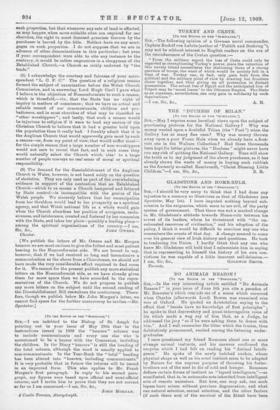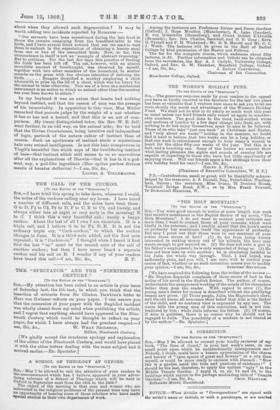DO ANIMALS REASON P
[TO TUB EDITOt Or TAM "SrlIOTATOR."] StR,—In the very interesting article entitled "Do Animals Reason?" in your issue of June 5th you cite a paradox of Mr. Brewater's which rem:nds me of a scene which occurred when Charles (afterwards Lord) Bowen was examined viva voce at Oxford. He quoted an Aristotelian saying to the effect that "beasts have no knowledge of first principles" ; he spoke in that deprecatory and quasi-interrogative voice of his which made a wag say of him that, as a Judge, he addressed the jury " HB if Ile were asking them to dance with him." And I well remember the titter which the truism, thus dubitatively pronounced, excited among the listening under- graduates.
I once questioned my friend Romanes about one or more strange animal instincts, and his answers confirmed the surprise which I had felt on reading his "Animal Intelli- gence." He spoke of the newly hatched cuckoo, whose physical shape as well as his cruel instinct seem to be adapted by Nature for the express purpose of throwing his foster- brothers out of the nest to die of cold and hunger. Romanes defines certain forms of instinct as "lapsed intelligence,"—as manifested, that is, in automatic acts inherited from intelligent acts of remote ancestors. But how, one may ask, can such lapses have arisen without- previous degeneration, and what can natural selection, sexual selection, and the other factors (if such there are) of the survival of the fittest have been
about when they allowed such degeneration ? It may be 'worth adding two incidents reported by Romanes :—
"Our servants have been accustomed during the late frost to throw the crumbs remaining from the breakfast-table to the birds, and I have several times noticed that our cat used to wait there in ambush in the expectation of obtaining a hearty meal from one or two of the assembled birds. Now, so far, this circumstance in itself is not an ` example of abstract reasoning.' But to continuo. For the last few days this practice of feeding tho birds has been left off. The cat, however, with an almost incredible amount of forethought, was observed by myself, together with two other members of the household, to scatter crumbs on the grass with the obvious intention of enticing tho birds. . . . . Ranger described a monkey employing a stick wherewith to prise up the lid of a chest, which was too heavy for the animal to raise otherwise. This use of a lever as a mechanical instrument is an action to which no animal other than the monkey Las ever been known to attain.'
In my boyhood it was an axiom that beasts had nothing beyond instinct, and that the reason of man was the presage of his immortality. In opposition to this view, Max Muller remarked that parrots judge by the weight of a nut whether it has or has not a kernel, and that this is an act of com-
parison. My (once) distinguished tutor, the Rev. W. E. Jelf, went further, in an odd way, on the animal side; for he held
that the Divine Omniscience, being intuitive and independent of logic, partook of the nature rather of instinct than of reason. Such an apotheosis of instinct sheds a mysterious halo over animal intelligence. Is not this halo conspicuous in Virgil's beautiful line which says of the bewildering instinct of bees—that instinct which still seems to us so marvellous after all the explanations of Darwin—that it has in it a god- sent, nay, a god-like ingredient (Esse apibus partem divines mentis et haustua Aetherios) ?—I am, Sir, &c.,
LIONEL A. TOLIEMACHE.











































 Previous page
Previous page